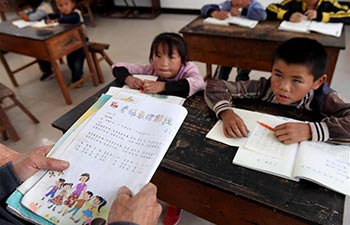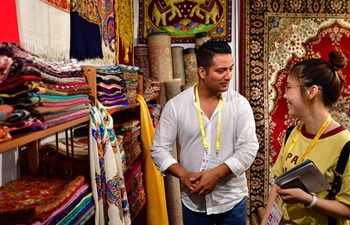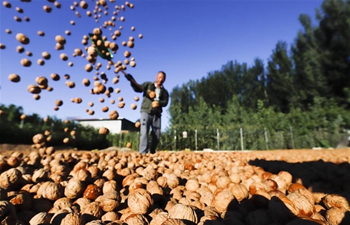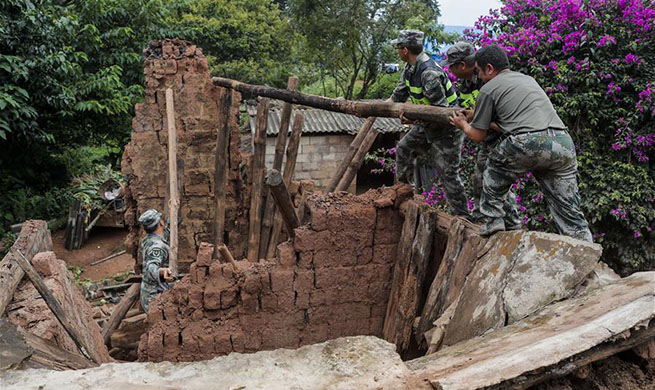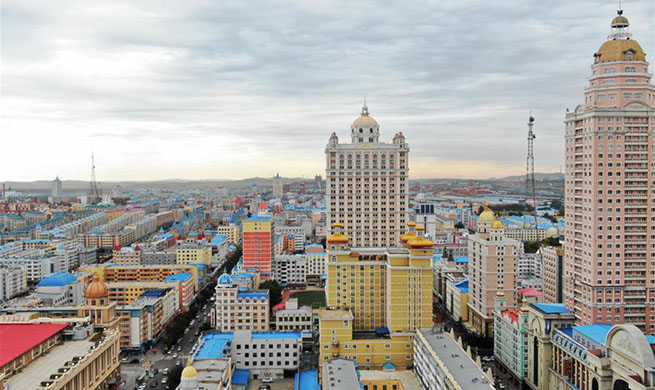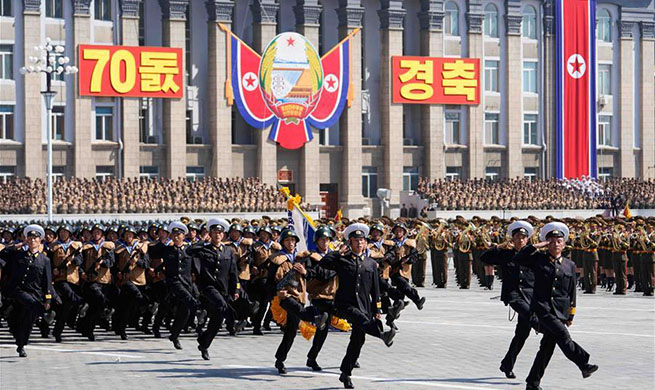MOSCOW, Sept. 9 (Xinhua) -- Sadyk Bolat is a pioneering entrepreneur in Kazakhstan who started doing business with the Chinese decades ago.
In the 1990s, he opened a market in Kazakhstan for Chinese goods and invited some 200 Chinese businessmen to bring over their products. The quality yet affordable goods soon became popular.
Since the Belt and Road Initiative (BRI) was put forward in 2013 by China, Bolat has expanded his business to construction, industry and agro-processing.
A KAZAKH PIONEER'S WISH LIST
He has also opened dozens of new trading markets and malls in Kazakhstan, including the Big Shanghai market in Astana, which can accommodate over 10,000 stalls and brings him millions of dollars in rent every month. The market sells fruits and vegetables, construction materials and other goods from China.
In 2016, one of Bolat's companies signed a cooperation agreement with a Chinese enterprise to set up a wheat processing plant in Kazakhstan's northern city of Kostanay and produce mainly flour and starch. This year, a company under Bolat's banner and a Chinese enterprise jointly won the bid to build 100 km of a highway leading to Russia. The construction will start next year. Now Bolat is negotiating with a Chinese tractor factory to establish an agricultural park and manufacture agro-machinery in Astana.
The BRI has brought the entrepreneur not only merchandise trade, but also the models, ways and plans for future development. Today his wish list includes building solar power plants and opening car accessory and car wash centers.
With the BRI resurrecting the ancient Silk Road, the Eurasian trading artery for silk, tea, porcelain and precious metals more than 2,000 years ago, trains have replaced camel caravans, paved expressways have taken the place of desert and mountain trails, and project cooperation and exchange of development modes and strategies have enriched the renewed trade along the route.
A BELARUSIAN DEVELOPMENT JOURNEY
Almost every morning, Kirill Koroteev, first deputy director general of the China-Belarus Industrial Park Development Company, drives from his home in Minsk, capital of Belarus, to the China-Belarus Industrial Park in the eastern suburbs, picking up two colleagues on the way.
In May 2015, China and Belarus decided to build the industrial park as a key project on the Silk Road Economic Belt, the overland component of the BRI, and make it a model of their mutually beneficial cooperation.
The Belarusian government has declared the park a pivotal project to promote the development of Belarus's related industries, Koroteev said.
The first phase of infrastructure construction of the 8.5-square-km park has been largely completed and 37 companies from China, Russia, Germany, Austria, the United States and Israel as well as Belarus, have started operating from there.
Koroteev, former director of the investment bureau of Belarus's Economy Ministry, was involved in drafting the state documents supporting the BRI. "Belarus is one of the first countries to support the BRI and I am proud of it," he said.
The new job means heavier responsibilities and pressure. But Koroteev still prefers it because here he can directly take part in projects and see the outcome of the joint construction of the Belt and Road by the two countries.
THE KYRGYZ DREAM
In another part of Central Asia, buses bearing banners saying "China-Kyrgyzstan Friendship" are a common sight in the streets of Bishkek, capital of Kyrgyzstan.
With more and more Chinese enterprises and projects arriving and creating local jobs, learning the Chinese language has become a goal for many locals.
Liu Vladimir, who was born in Vladivostok, Russia, is a well-known sinologist in Kyrgyzstan today.
The 65-year-old studied Chinese at the Russian Far Eastern National University and became a Chinese language translator after graduation. In the early 1990s, he began teaching Chinese at the Bishkek Humanities University and this summer, retired as director of the Confucius Institute at the university.
"I have done just two things in my life. One is learning Chinese, the other is teaching Chinese," he said, laughing.
For more than 20 years, Liu and his colleagues have taught nearly 3,000 students pursuing Chinese language studies. Now some of them work for Chinese enterprises, some serve at Kyrgyz government organs, and some have become Chinese language teachers, just like Liu.
The Chinese language has shaped his whole life and his aspiration today is to bring up more Chinese language talents. I hope China realizes the "Chinese Dream", he said. Then my students can utilize what they have learned to realize their "Kyrgyz Dream."

